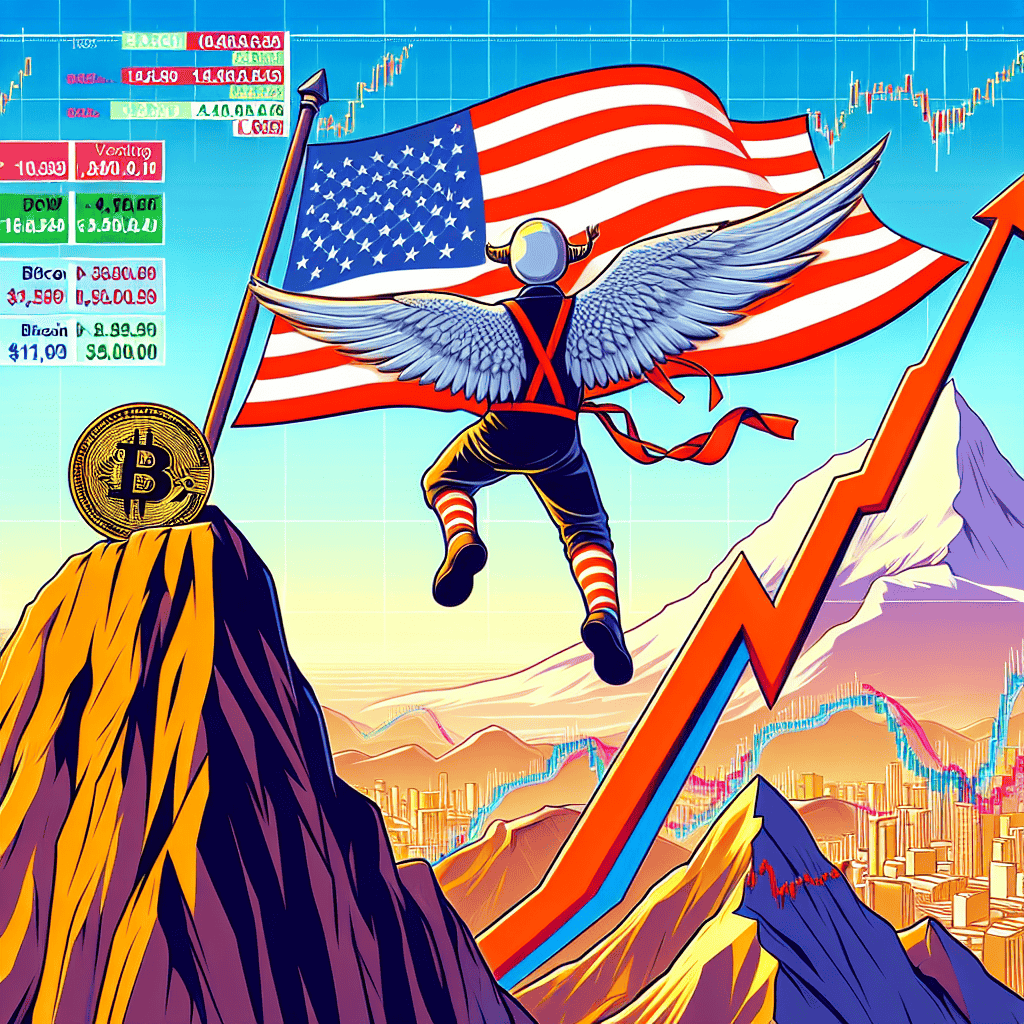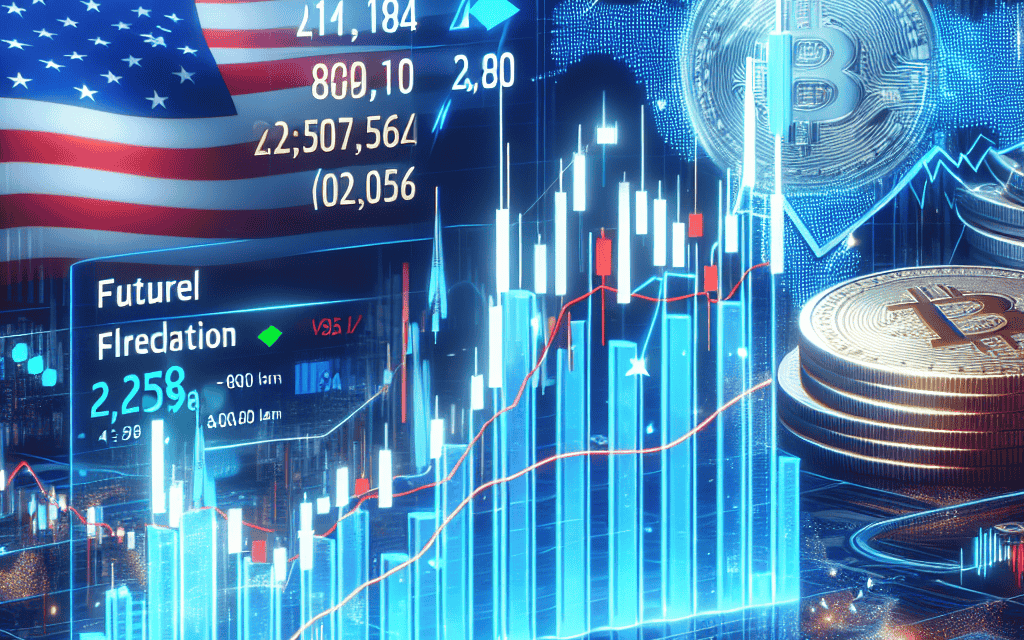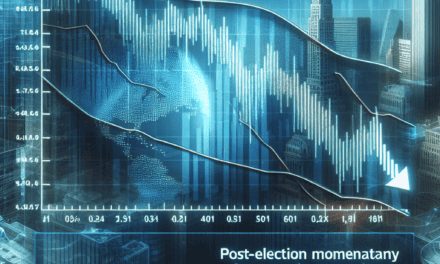“Markets Rally as Trump Leads: Dow Futures Soar, Bitcoin Hits New Heights”
Introduction
The intersection of political events and financial markets often creates a dynamic landscape for investors and analysts alike. As the latest election unfolds, the impact on markets is palpable, with Dow futures experiencing a notable surge and Bitcoin reaching new peaks. This market response is closely tied to the current political climate, where former President Donald Trump is leading in the polls. The live updates from this election period provide a real-time glimpse into how political developments can influence market sentiment and investor behavior. The fluctuations in traditional stock indices and the volatile cryptocurrency market underscore the intricate relationship between politics and economics, highlighting the importance of staying informed during such pivotal moments.
Analyzing Dow Futures: How Elections Influence Market Trends
The influence of elections on market trends is a subject of perennial interest to investors and analysts alike. As the political landscape shifts, so too do the dynamics of financial markets, with the Dow Futures often serving as a barometer for investor sentiment. In the current election cycle, with Donald Trump taking a lead in the polls, the Dow Futures have experienced a notable surge, reflecting the market’s response to potential policy shifts and economic strategies that a Trump administration might implement. This phenomenon is not isolated, as historical data consistently shows that markets react to the perceived economic policies of leading candidates.
To understand the impact of elections on market trends, it is essential to consider the underlying factors that drive investor behavior. Elections introduce a degree of uncertainty, which can lead to volatility in the markets. Investors tend to react to the anticipated economic policies of candidates, such as tax reforms, regulatory changes, and fiscal spending plans. In the case of Trump, his previous tenure as president provides a reference point for investors, who may anticipate a return to policies that favor deregulation and tax cuts, potentially boosting corporate profits and, by extension, stock prices.
Moreover, the surge in Dow Futures can be attributed to the market’s forward-looking nature. Investors often make decisions based on expectations of future economic conditions rather than current realities. As Trump leads in the polls, market participants may be pricing in the likelihood of a business-friendly environment, which could stimulate economic growth. This optimism is reflected in the rising Dow Futures, as investors position themselves to capitalize on potential gains.
In addition to the stock market, the cryptocurrency market has also been affected by the election dynamics. Bitcoin, in particular, has reached new peaks, driven by a combination of factors including increased institutional interest and its perception as a hedge against economic uncertainty. The prospect of a Trump presidency may further fuel this trend, as investors seek alternative assets to diversify their portfolios amidst potential market fluctuations.
Transitioning from the immediate market reactions, it is crucial to consider the long-term implications of election outcomes on market trends. While short-term volatility is common, the lasting impact of an election is often determined by the actual implementation of policies and their effectiveness in addressing economic challenges. For instance, if a Trump administration were to successfully enact policies that stimulate economic growth, the initial surge in Dow Futures could translate into sustained market gains. Conversely, if policy implementation falls short of expectations, markets may adjust accordingly, leading to potential corrections.
Furthermore, it is important to recognize that market reactions are not solely driven by domestic factors. Global economic conditions, geopolitical tensions, and international trade relations also play significant roles in shaping market trends. As such, while the election outcome is a critical factor, it is one of many variables that investors must consider when analyzing market movements.
In conclusion, the current surge in Dow Futures and the peak in Bitcoin prices underscore the significant impact that elections can have on market trends. As investors navigate the complexities of the political landscape, they must remain vigilant and adaptable, considering both the immediate reactions and the long-term implications of election outcomes. By doing so, they can better position themselves to manage risks and seize opportunities in an ever-evolving market environment.
The Role of Political Uncertainty in Bitcoin’s Market Fluctuations
Political uncertainty has long been a significant factor influencing market dynamics, and the cryptocurrency market is no exception. As the world closely monitors the unfolding election results, the impact on various financial instruments becomes increasingly evident. Notably, Bitcoin, the leading cryptocurrency, has shown a marked sensitivity to political developments, with its value often fluctuating in response to electoral outcomes and the associated economic implications. This phenomenon is particularly pronounced during periods of heightened political uncertainty, such as the current election cycle, where the potential for significant policy shifts looms large.
In the context of the ongoing election, Bitcoin’s market behavior underscores the broader trend of cryptocurrencies reacting to geopolitical events. As Donald Trump takes the lead in the election, Bitcoin has experienced a notable peak, reflecting investor sentiment and the perceived implications of a Trump administration on economic policy. This surge can be attributed to several factors, including the anticipation of regulatory changes, fiscal policies, and the overall economic environment that a Trump presidency might entail. Investors often view Bitcoin as a hedge against traditional market volatility, and its decentralized nature makes it an attractive asset during times of political flux.
Moreover, the relationship between political uncertainty and Bitcoin’s market fluctuations is not merely a short-term phenomenon. Historical data suggests that Bitcoin tends to experience increased volatility during election periods, as investors seek refuge from potential market disruptions. This behavior is further amplified by the speculative nature of the cryptocurrency market, where rapid price movements can occur based on perceived future events rather than immediate economic indicators. Consequently, Bitcoin’s price trajectory during election cycles can serve as a barometer for investor confidence and market sentiment.
Transitioning to the broader market implications, the surge in Dow futures alongside Bitcoin’s peak highlights the interconnectedness of global financial markets. While traditional assets like stocks and bonds are directly influenced by political outcomes, cryptocurrencies offer an alternative investment avenue that is less tethered to specific national policies. This distinction is crucial, as it allows investors to diversify their portfolios and mitigate risks associated with political uncertainty. However, it also introduces a layer of complexity, as the cryptocurrency market’s response to political events can be unpredictable and driven by a myriad of factors beyond conventional economic analysis.
Furthermore, the role of media coverage and public perception in shaping Bitcoin’s market behavior cannot be understated. As live updates and real-time information become increasingly accessible, investors are more attuned to political developments and their potential impact on financial markets. This heightened awareness can lead to rapid shifts in market sentiment, as evidenced by the current election’s influence on Bitcoin’s valuation. The interplay between media narratives and investor behavior underscores the importance of information dissemination in the digital age, where market participants are constantly seeking insights to inform their investment decisions.
In conclusion, the ongoing election serves as a poignant reminder of the intricate relationship between political uncertainty and Bitcoin’s market fluctuations. As investors navigate this complex landscape, understanding the underlying factors driving cryptocurrency valuations becomes paramount. While Bitcoin’s decentralized nature offers a degree of insulation from traditional market forces, its susceptibility to political developments highlights the need for a nuanced approach to investment strategies. As the election unfolds and its implications become clearer, the cryptocurrency market will undoubtedly continue to reflect the broader economic and political landscape, offering valuable insights into the evolving dynamics of global finance.
Historical Election Outcomes and Their Impact on Financial Markets
Throughout history, financial markets have often reacted with volatility and unpredictability during election periods, reflecting the uncertainty and potential policy shifts that accompany changes in political leadership. The impact of elections on markets is a multifaceted phenomenon, influenced by investor sentiment, anticipated policy changes, and the broader economic environment. As we examine historical election outcomes, it becomes evident that markets tend to respond not only to the election results themselves but also to the perceived implications of those results on economic policies and regulatory frameworks.
In the United States, presidential elections have historically been pivotal moments for financial markets. For instance, the election of Franklin D. Roosevelt in 1932, during the Great Depression, marked a significant shift in economic policy with the introduction of the New Deal. This led to a period of market optimism as investors anticipated government intervention to stimulate economic recovery. Similarly, the election of Ronald Reagan in 1980 brought about expectations of deregulation and tax cuts, which were met with a bullish response from the markets.
Transitioning to more recent history, the 2008 election of Barack Obama occurred amidst the global financial crisis. The markets were initially volatile, reflecting uncertainty about the new administration’s approach to economic recovery. However, as the administration’s policies became clearer, including the implementation of the American Recovery and Reinvestment Act, investor confidence gradually improved, leading to a market rebound.
In contrast, the 2016 election of Donald Trump was marked by immediate and significant market reactions. The unexpected victory led to a surge in stock market indices, with the Dow Jones Industrial Average experiencing a notable increase. This was largely driven by investor expectations of corporate tax cuts, deregulation, and infrastructure spending, which were central themes of Trump’s campaign. The so-called “Trump rally” exemplified how markets can react positively to anticipated pro-business policies, despite initial uncertainties.
Moreover, the impact of elections is not confined to traditional financial markets. The rise of cryptocurrencies has introduced a new dimension to market reactions. Bitcoin, for instance, has shown sensitivity to political events, including elections. During periods of political uncertainty, such as elections, investors often seek alternative assets like Bitcoin as a hedge against potential market volatility. This was evident during the 2020 U.S. presidential election, where Bitcoin experienced significant price fluctuations in response to the evolving political landscape.
As we consider the current election cycle, with Donald Trump once again in the lead, it is crucial to recognize the potential implications for financial markets. The surge in Dow futures and the peak in Bitcoin prices reflect investor anticipation of policy continuity and potential economic stimulus measures. However, it is important to note that market reactions are not solely determined by election outcomes but are also influenced by broader economic conditions, geopolitical factors, and investor sentiment.
In conclusion, historical election outcomes have consistently demonstrated their capacity to influence financial markets, often resulting in periods of heightened volatility and uncertainty. As investors navigate the complexities of election cycles, understanding the interplay between political developments and market dynamics becomes essential. By examining past election impacts, investors can gain valuable insights into potential market trends and make informed decisions in the face of political change.
Trump’s Lead: Immediate Reactions in Global Stock Markets

As the latest election results unfold, the global financial markets are responding with notable volatility, reflecting the uncertainty and anticipation surrounding the potential outcomes. With former President Donald Trump currently in the lead, immediate reactions in the global stock markets have been swift and pronounced. Investors, analysts, and policymakers are closely monitoring these developments, as the implications of a Trump lead could significantly influence economic policies and market dynamics.
In the United States, Dow futures have surged in response to Trump’s lead, indicating a positive sentiment among investors who anticipate a continuation of business-friendly policies. This surge suggests that market participants are optimistic about potential tax cuts, deregulation, and other economic measures that were hallmarks of Trump’s previous administration. The anticipation of such policies often leads to increased investor confidence, driving up stock prices and futures. Moreover, sectors that traditionally benefit from Republican leadership, such as energy and finance, are experiencing heightened interest and activity.
Transitioning to the cryptocurrency market, Bitcoin has reached new peaks, reflecting a broader trend of digital assets gaining traction during periods of political uncertainty. Investors often turn to cryptocurrencies as a hedge against traditional market volatility, and the current election scenario is no exception. The decentralized nature of Bitcoin and its perceived independence from government influence make it an attractive option for those seeking stability amidst potential policy shifts. As a result, Bitcoin’s value has surged, capturing the attention of both seasoned investors and newcomers to the digital currency space.
Meanwhile, global stock markets are exhibiting mixed reactions, with some regions experiencing gains while others face declines. In Europe, major indices have shown resilience, buoyed by the prospect of continued transatlantic trade relations and potential economic cooperation. However, concerns about geopolitical tensions and trade policies remain, leading to cautious optimism among European investors. In Asia, markets are reacting with a degree of caution, as the region grapples with the implications of a Trump-led administration on trade agreements and economic partnerships.
Furthermore, the foreign exchange markets are witnessing fluctuations, with the U.S. dollar experiencing a temporary boost. This increase is largely attributed to investor expectations of a strong U.S. economy under Trump’s leadership, which could lead to higher interest rates and a more robust dollar. However, currency markets remain highly sensitive to political developments, and any shifts in the election narrative could quickly alter this trajectory.
In addition to these immediate market reactions, long-term implications are also being considered by investors and analysts. A Trump lead could potentially reshape international trade policies, impact global supply chains, and influence diplomatic relations. These factors are critical for multinational corporations and investors with global portfolios, as they navigate the complexities of an interconnected world economy.
In conclusion, the immediate reactions in global stock markets to Trump’s lead in the election are characterized by a mix of optimism and caution. While Dow futures surge and Bitcoin peaks, reflecting investor confidence in certain sectors and assets, the broader market landscape remains fluid and subject to change. As the election results continue to unfold, market participants will remain vigilant, assessing the potential impacts on economic policies and global financial stability. The coming days will be crucial in determining the direction of these markets, as investors seek to position themselves strategically in response to the evolving political landscape.
Cryptocurrency Volatility: Bitcoin’s Response to Political Shifts
In the ever-evolving landscape of global finance, the intersection of politics and markets often creates a dynamic environment characterized by volatility and opportunity. As the latest election results unfold, the financial world is witnessing a significant impact on various asset classes, notably within the cryptocurrency sector. Bitcoin, the flagship digital currency, has demonstrated a remarkable response to the political shifts, particularly with former President Donald Trump gaining a lead in the election. This development has not only influenced traditional markets, such as the Dow futures, but has also sent ripples through the cryptocurrency market, highlighting Bitcoin’s inherent volatility and its sensitivity to geopolitical events.
To understand Bitcoin’s response, it is essential to consider the broader context of market sentiment. Historically, Bitcoin has been perceived as a hedge against traditional financial systems, often gaining traction during periods of economic uncertainty or political upheaval. The current election scenario, with its potential implications for economic policy and regulatory frameworks, has amplified Bitcoin’s appeal as an alternative asset. As investors seek refuge from the unpredictability of conventional markets, Bitcoin’s decentralized nature and limited supply have positioned it as a viable store of value, driving its price to new peaks.
Moreover, the surge in Bitcoin’s value can be attributed to the growing acceptance and integration of cryptocurrencies into mainstream financial systems. Over recent years, institutional investors have increasingly embraced Bitcoin, recognizing its potential to diversify portfolios and enhance returns. This institutional interest has provided a level of stability and legitimacy to the cryptocurrency market, encouraging more investors to participate. Consequently, as political developments unfold, Bitcoin’s price movements are not merely speculative but are also influenced by strategic decisions made by large financial entities.
In addition to institutional factors, the role of retail investors cannot be overlooked. The democratization of trading platforms and the proliferation of information through social media have empowered individual investors to engage actively in the cryptocurrency market. This democratization has led to heightened market activity, as retail investors react swiftly to political news, further contributing to Bitcoin’s volatility. The current election, with its high stakes and global attention, has undoubtedly captured the interest of retail investors, prompting them to adjust their positions in response to the evolving political landscape.
Furthermore, the impact of regulatory considerations on Bitcoin’s price dynamics cannot be understated. Political leadership plays a crucial role in shaping the regulatory environment for cryptocurrencies. With Trump in the lead, market participants are speculating on potential policy shifts that could affect the cryptocurrency sector. The anticipation of regulatory changes, whether perceived as favorable or restrictive, adds another layer of complexity to Bitcoin’s price movements. Investors are closely monitoring the election outcome, as it may signal future regulatory directions that could either bolster or hinder the growth of the cryptocurrency market.
In conclusion, Bitcoin’s response to the current political shifts underscores its status as a volatile yet compelling asset in times of uncertainty. The interplay between institutional and retail investors, coupled with regulatory considerations, creates a multifaceted environment where Bitcoin thrives on both speculation and strategic investment. As the election results continue to unfold, the cryptocurrency market remains a focal point for investors seeking to navigate the complexities of a rapidly changing financial landscape. The ongoing developments serve as a reminder of the intricate relationship between politics and markets, where each influences the other in profound and often unpredictable ways.
Comparing Market Reactions: Traditional Stocks vs. Digital Assets
As the political landscape shifts with the latest election developments, financial markets are responding in real-time, reflecting investor sentiment and economic forecasts. The current scenario, with Donald Trump taking a lead in the election, has sparked notable movements across both traditional stock markets and digital asset platforms. This dynamic interplay between political events and market reactions offers a fascinating glimpse into the differing behaviors of traditional stocks and digital assets like Bitcoin.
In the realm of traditional stocks, Dow futures have experienced a significant surge. This uptick can be attributed to investor optimism surrounding potential policy continuities and economic strategies associated with Trump’s leadership. Historically, markets have shown a tendency to favor predictability and stability, often reacting positively to incumbents or familiar political figures. The anticipation of business-friendly policies, such as tax cuts and deregulation, typically associated with Trump’s administration, may be fueling this bullish sentiment. Moreover, the prospect of continuity in economic policies provides a sense of security to investors, encouraging them to increase their exposure to equities.
Conversely, the digital asset market, particularly Bitcoin, is also witnessing a peak, albeit driven by different factors. Bitcoin’s rise can be linked to its perception as a hedge against economic uncertainty and inflation. As traditional markets react to political developments, digital assets often serve as an alternative investment avenue, attracting those seeking to diversify their portfolios. The decentralized nature of cryptocurrencies, coupled with their limited supply, makes them appealing during times of political and economic flux. Furthermore, the increasing institutional adoption of Bitcoin and other cryptocurrencies has bolstered their legitimacy, drawing in a broader range of investors.
While both traditional stocks and digital assets are experiencing upward trends, the underlying reasons for these movements highlight the contrasting characteristics of these markets. Traditional stocks are largely influenced by macroeconomic policies and geopolitical stability, whereas digital assets are driven by technological innovation and the quest for financial autonomy. This divergence underscores the importance of understanding the unique factors that influence each market segment.
Moreover, the current market reactions also reflect broader trends in investor behavior. The surge in Dow futures suggests a continued reliance on established financial systems and a belief in the resilience of traditional economic structures. On the other hand, the peak in Bitcoin prices indicates a growing appetite for alternative investments and a shift towards digital finance. This duality in market responses illustrates the evolving landscape of global finance, where traditional and digital assets coexist and interact in complex ways.
As the election unfolds and further developments emerge, market participants will continue to closely monitor the situation, adjusting their strategies accordingly. The interplay between political events and market reactions serves as a reminder of the intricate connections between governance, economics, and investor sentiment. In this ever-changing environment, both traditional stocks and digital assets offer unique opportunities and challenges, requiring investors to remain vigilant and adaptable.
In conclusion, the current election scenario has triggered significant movements in both traditional stock markets and digital asset platforms. While Dow futures surge on the back of anticipated policy continuities, Bitcoin peaks as investors seek alternatives amidst economic uncertainty. This comparison of market reactions highlights the distinct characteristics and driving forces behind traditional stocks and digital assets, offering valuable insights into the complex dynamics of modern financial markets.
Live Updates: Tracking Market Movements During Election Night
As the election night unfolds, market participants are closely monitoring the developments, with significant attention directed towards the impact of the electoral outcomes on various financial markets. The anticipation surrounding the election results has already begun to manifest in market movements, with Dow futures experiencing a notable surge and Bitcoin reaching new peaks. These fluctuations underscore the intricate relationship between political events and market dynamics, as investors attempt to navigate the uncertainties inherent in such pivotal moments.
In the early hours of the election night, Dow futures have shown a marked increase, reflecting investor optimism as preliminary results indicate a lead for former President Donald Trump. This surge can be attributed to market perceptions of Trump’s economic policies, which are generally viewed as business-friendly, particularly in terms of tax cuts and deregulation. Investors often react favorably to the prospect of continuity in policies that are perceived to stimulate economic growth and corporate profitability. Consequently, the upward movement in Dow futures suggests a positive sentiment among market participants who anticipate a stable economic environment under a potential Trump administration.
Simultaneously, the cryptocurrency market is witnessing significant activity, with Bitcoin reaching new peaks. The digital currency’s ascent can be linked to several factors, including its perceived status as a hedge against economic uncertainty and inflation. As election results unfold, the potential for market volatility increases, prompting investors to seek refuge in assets that are considered relatively insulated from traditional market fluctuations. Bitcoin, with its decentralized nature and limited supply, often emerges as an attractive option for those looking to diversify their portfolios amidst political and economic unpredictability.
Moreover, the lead for Trump in the election results has further fueled Bitcoin’s rise, as his administration has historically been more open to the burgeoning cryptocurrency sector compared to his political counterparts. This perceived regulatory leniency could be encouraging investors to increase their exposure to digital assets, anticipating a favorable environment for the growth and adoption of cryptocurrencies.
As the night progresses, it is crucial to recognize that market reactions are inherently speculative and subject to rapid change as more concrete election results become available. The initial surge in Dow futures and Bitcoin’s peak are reflective of current market sentiment, which may evolve as the electoral landscape becomes clearer. Investors are advised to exercise caution and remain vigilant, as the final outcome of the election could lead to different market trajectories.
Furthermore, it is important to consider the broader implications of the election on global markets. The United States, being a major economic powerhouse, has a significant influence on international trade and financial systems. Consequently, the election results could have far-reaching effects, impacting not only domestic markets but also global economic stability. Investors worldwide are likely to be closely watching the developments, adjusting their strategies in response to the evolving political and economic landscape.
In conclusion, the election night is proving to be a critical juncture for financial markets, with Dow futures surging and Bitcoin reaching new heights as Trump takes the lead. These movements highlight the complex interplay between political events and market behavior, as investors seek to position themselves advantageously amidst uncertainty. As the night unfolds, continued vigilance and adaptability will be essential for navigating the potential market shifts that may arise from the final election outcomes.
Q&A
1. **Question:** How did Dow Futures react to the election news?
– **Answer:** Dow Futures surged in response to the election news.
2. **Question:** What was the impact on Bitcoin prices during the election updates?
– **Answer:** Bitcoin prices peaked as the election updates showed Trump in the lead.
3. **Question:** What specific event caused the market reaction?
– **Answer:** The market reaction was caused by live updates indicating that Trump was leading in the election.
4. **Question:** How did investors perceive the potential outcome of the election?
– **Answer:** Investors perceived the potential outcome of Trump leading as favorable, prompting a surge in market activity.
5. **Question:** Were there any other significant market movements besides Dow Futures and Bitcoin?
– **Answer:** The focus was primarily on Dow Futures and Bitcoin, but other markets may have experienced volatility as well.
6. **Question:** What are the implications of such market movements for future trading sessions?
– **Answer:** Such market movements suggest increased volatility and potential for further fluctuations in future trading sessions based on election outcomes.
7. **Question:** How do political events like elections typically impact financial markets?
– **Answer:** Political events like elections can lead to significant market volatility as investors react to potential policy changes and economic implications.
Conclusion
The election’s impact on markets is evident as Dow futures experience a surge and Bitcoin reaches a peak, reflecting investor optimism and market volatility in response to political developments. With Trump in the lead, market participants may anticipate favorable economic policies, driving positive sentiment in traditional and digital asset markets. This dynamic underscores the significant influence political outcomes can have on financial markets, highlighting the interconnectedness of politics and economic performance.





